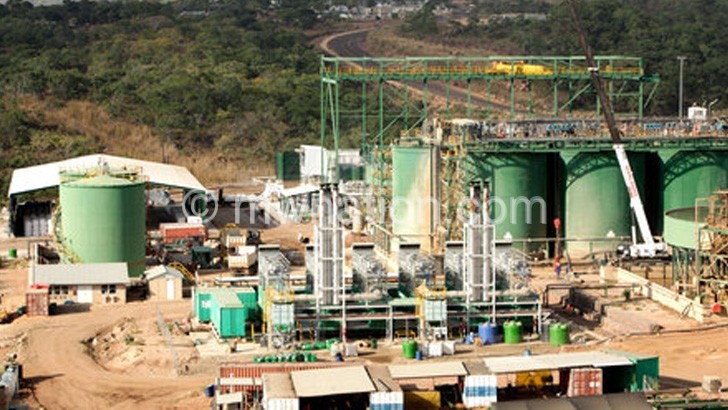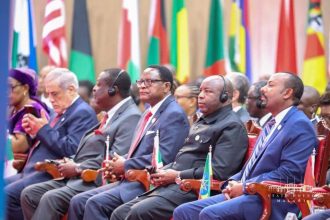Of mining in malawi still in infancy
On June 17, energy and mining expert Grain Malunga, told Weekend Nation that it would be too ambitious for government to count on mining particularly coal and uranium as a revenue source in the short-term. Malunga, who once served as Minister of Natural Resources, Energy and Mining was reacting to the recently released 2017 Annual Economic Report in which government states that revenue generated from the mining and quarrying sector is projected to register a 1.6 percent growth rate this year and government officials hoped the sector would help Malawi economy turn the corner. In this article, KAMUZU CHIBAMBO* disagrees and argues that Malawi can still leap huge benefits from coal and uranium.

While I agree with Grain Malunga that Malawi should broaden the spectrum of mining activities and strengthen the legal framework, I disagree with his assertion that we cannot pin hopes on mining in Malawi now.
When shall that moment arrive?
Matter of fact, Malawi would by now have reaped huge benefits from the mining industry only if we had been smarter and not reckless with our non-renewable natural resources.
It is common knowledge that a lot of our precious stones such as rubies and minerals continue to be smuggled out of the country in the name of samples or otherwise. This sad reality is the story of the Democratic Republic of Congo (DRC) which despite having enormous wealth underneath the earth’s surface, the country is still wallowing in poverty.
Mineral dealers and syndicates meanwhile are busy creating and fuelling tribal conflicts but through the back door raking in immense profits while the host country is languishing in deeper poverty.

Many individuals and syndicates have become rich on our backs.
Let us look at the Kayelekera [Uranium] mining deal which no doubt raised mining in Malawi to an unprecedented level.
So many things went wrong from inception, which have resulted in the country being deprived of better financial gains. It was a badly negotiated deal. Let me highlight some of these areas:
Grade
Not many Malawians are aware that the uranium from Karonga is first grade which naturally ought to fetch higher prices. The investor despite the often projected negative picture must have made handsome profits when prices on the world market were still good during the early years of operation. What came to Malawi is change.
Royalty
For the first three years of operations, government officials negotiated a meagre 1.5 percent and, thereafter, a three percent royalty which was in clear violation of the five percent royalty rate prescribed under our own Mines and Minerals Act; why did government officials breach their own law and opt for less? An explanation is merited.
Tax holiday
The 10-year tax holiday which several others have questioned was a gross error on the part of government which has denied the nation of much needed resources.
Health facility
Under the Development Agreement, the investor undertook to construct ‘a clinic to a typical standard’ which I consider falling rather too short of what ought to have been constructed. It is a well known fact that uranium is highly radioactive. The incidence of contamination, therefore, cannot be remote.
What has troubled me most to this day is where our brothers and sisters go for suitable treatment in the event of contamination. I am not aware of a single Malawian who may have been flown outside the country for specialist treatment. Government officials ought to have insisted under the Development Agreement on a specialist health facility as one of the company’s corporate responsibilities as opposed to an ordinary health facility. Our people have been dangerously exposed. Ought not government officials to have been more concerned about the well being of their fellow Malawians?
Dividend
It is always naive to pin the nation’s hopes on any investors’ annual profits which many times are manipulated through transfer-pricing. What many multi-nationals do is arrange for a sister or sympathetic company outside the host nation to buy the local product. This is how many African nations have been swindled of their immense wealth. The price that is locally disclosed is often minimal and therefore low. Once the product has crossed the border and landed at the pseudo buyer, that’s where real profits are derived. This criminal behaviour must be stopped with immediate effect if we are to benefit from exports. Other nations like Botswana have turned the tables by demanding a certain degree of local processing. Malawi needs to be more intentional by demanding a regime of not less than 40 percent of local processing before any commodity is exported if we are serious about taking the country from the top position of the ‘poorest’ nation in the whole world.
Of course, a business may genuinely incur losses or indeed prices on the world market may be collapse which means no dividend would be payable by any such company. However, the fact that the investor has not left the nation is more telling. Let us quickly open our eyes and see beyond the surface.
Government stake
I am often baffled by the toxic thinking that continues to dominate the mining industry. In a majority of cases, government’s stake or share holding in joint ventures is considerably below 50 percent. The rational for this approach as I understand is it is the investor that is injecting all the money while government is not. As for Kayelekera Uranium Mine, government’s stake held—on behalf of the 17 million Malawians—is only 15 percent. This thinking in my view is fundamentally flawed. In the first place, to whom does the resource belong? The nation’s contribution is the resource itself which the investor is investing in. The least shareholding for the Nation therefore ought to be not less than 50 percent. Malawi wake-up!
Selling rights
If Malawi is to meaningfully benefit from the mining industry and start to address the abject poverty that continues to torture over 80 percent of Malawians, we must introduce in Development Agreements the concept of Selling Rights. How this works is like this: Let’s imagine our total shareholding in Kayelekera Mine is 58 percent. We could designate under the Agreement a fixed percentage, say 15 percent, of the total ore that is mined. Then we go to the world market and identify a buyer. In other words, government would individually go on the international market and find a buyer of the 15 percent of the product. All the proceeds from the 15 percent would come back and beef up government coffers. In this information age, finding a buyer on the world market cannot be an insurmountable challenge. I hope the new law under process can adopt some of these recommendations so our economy can have the prospect of growing above five percent. It is simply unacceptable that 53 years after independence we should still think nations of the world owe us a livelihood.
Environmental concerns
Our desire for money must not to be at the expense of our environment. In the creation account, one of the man’s responsibilities given by the Creator was ‘ to replenish the earth’. In Malawi we have done the opposite by severely damaging the environment. Government ought to swiftly put adequate measure to preserve and conserve what is left. Deploying the military if properly managed is one of the short term solutions. Obviously a long term solution is an absolute must. As for Kayelekera, can government officials publicly assure the Malawian people that International Atomic Energy Agency codes, Malawi’s environmental laws and standards pertaining to uranium mining have been and continue to be complied with by the investor as stated under the Development Agreement?
Punishment
If the wanton depletion of natural resources is to be stemmed, a tougher law must be enacted that punishes government officials who enter into crooked or reckless deals. To shield their wrongs, they make Developments Agreements secret. The main stakeholders, who are the people of Malawi, are kept in the dark as to the contents of such Agreements. This must be condemned in the strongest terms possible.
Matter of fact any Government official that refuses to make such Agreement public before it is signed would not only be a violation of the Access to Information Act but more likely someone is getting kick backs. This trend must stop now. Therefore henceforth we expect any Development Agreements before it comes into effect to be made public and invite input from the general public. It is the expectation of many Malawians that the current government which is headed by a lawyer of international repute shall set the right precedent in proper management of natural resources and as well place firm emphasis on upholding the rule of law. Nothing less shall impress.
The legitimate expectation of the Malawian people is that the right foundation shall be laid by the current Government so that the nation’s huge deposits of resources in their various categories can be converted into liquid wealth that primarily benefits the poor Malawian majority. Everywhere one goes in Malawi is confronted by poverty except of course for small pockets of society. This violence must be stopped as a matter of urgency.
—*Kamuzu Chibambo is a lawyer with an LL M in Business and Trade Law from Erasmus University Rotterdam in Holland. He is also president of the Peoples Transformation Party (Petra).





